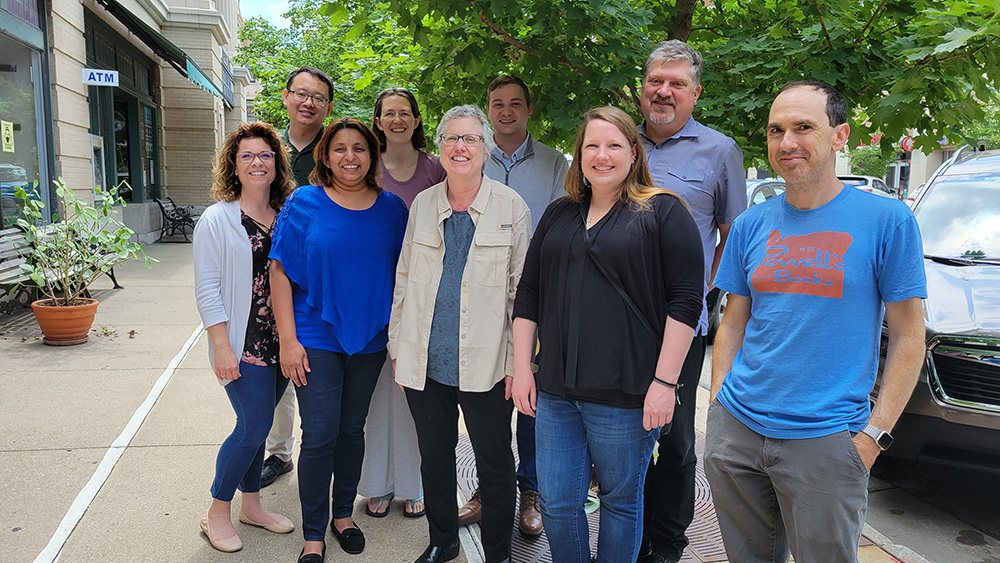$5.7 million NIH grant will fund final stretch of successful 15-year initiative
LAWRENCE — A University of Kansas research center developing technologies to better understand and diagnose disease has received a $5.7 million federal grant to sustain the collaborative, multidisciplinary research environment it has helped foster at KU since 2012 through its core laboratories and faculty programs.
The Center for Molecular Analysis of Disease Pathways is one of two KU research centers recognized as a Center of Biomedical Research Excellence, or COBRE, by the National Institutes of Health. COBREs are eligible for three phases of five-year, multimillion dollar grants through the NIH’s Institutional Development Award (IDeA) Program that can jump-start the careers of junior faculty members and dramatically increase a university’s research capabilities. This award represents CMADP’s third and final funding renewal.

“These are grants to promote science in states that don’t have a lot of current NIH funding,” said CMADP director and principal investigator Susan Lunte, Ralph N. Adams Distinguished Professor of Chemistry and Pharmaceutical Chemistry, who co-leads the center with Erik Lundquist, professor of molecular biosciences. “So the main goals of these COBRE grants are to improve the infrastructure in the state for doing research and also to help recruit and mentor junior investigators to make KU and other Regents institutions competitive for federal funding.”
In the decade since receiving the Phase 1 COBRE award, 24 junior faculty researchers supported by CMADP have brought more than $40.5 million in external funding to the state of Kansas. In addition to issuing project awards and contributions to new-hire startup packages, CMADP works with junior faculty to help them develop the strengths and skills needed for success in academic research careers by providing senior faculty mentorship, grant writing workshops and other career development activities.
Project funding from CMADP provided the basis for a number of recent notable achievements by KU faculty. Jennifer Robinson, assistant professor of chemical & petroleum engineering, received a five-year, $1.25 million Maximizing Investigators’ Research Award from the NIH to continue her work investigating the sex differences that attribute to higher incidence of osteoarthritis in females.
“As a new assistant professor, there are multiple challenges that make getting a lab established and productive feel very overwhelming,” Robinson said. “Funding from the Phase 2 CMADP COBRE was instrumental in supporting this phase of my research — both by providing critical funds for personnel and lab expenses, and also scientific feedback that helped clarify our research aims and approach.”
Jingxin Wang, assistant professor of medicinal chemistry and previous CMADP project investigator, recently received an NIH MIRA as well. Leveraging his CMADP project funding, he investigated a new direction for his research and is now part of a $1.2 million grant from the W.M. Keck Foundation to further explore the use of RNA splicing in drug and disease therapies.
“The generous support from Dr. Lunte, CMADP and core labs finally helped to yield our recent publication in ACS Central Science on the development of a new chemical genetic tool to study signaling pathways as the cover story of the journal’s next issue,” Wang said. “This opens a new research direction that has much potential in biological research. The project is actually a research direction that I had considered ‘cutting off’ before receiving the CMADP’s support as it would require too many resources that we can’t afford with my startup funds. Now this research tool and its applications are becoming one of my major contributions to the field.”
The sustainability of CMADP’s three core lab facilities — the KU (Ralph N. Adams) Nanofabrication Facility, Synthetic Chemical Biology Core and Genome Sequencing Core — is a major focus of this third phase of funding. Since CMADP’s inception, these facilities have supported more than 600 researchers and have been cited in more than 200 publications written by CMADP core lab users.
The capabilities and services of each of these core labs provide enabling technologies, new techniques and methods that allow researchers to study diseases in novel ways and develop new therapeutics for a range of illnesses, including heart and lung diseases, cancers, neurological diseases and infectious diseases like COVID-19. Through these labs, researchers have access to state-of-the-art facilities, instrumentation and technical expertise that is frequently out of reach for an individual research lab.
“The Genome Sequencing Core helps academic research groups at KU and across the state of Kansas access next-generation sequencing technology, and provides education, lab training and assistance to researchers,” said Jennifer Hackett, GSC director. “The GSC assisted COVID-19 research by sequencing changes in COVID-19 patients’ antibodies over time. This work helped lead to finding part of the DNA sequence and structure that allows for COVID-19 immunity.”
The Synthetic Chemical Biology Core is a shared core supported by both COBREs at KU. This chemistry-oriented core facility provides comprehensive synthetic chemistry capabilities, developing unique molecular probes and peptides that can be used to better understand disease. The KU Nanofabrication Facility offers resources and training for researchers to produce micro- and nanoscale devices used in biomedical, biophysical and bioanalytical studies related to disease pathways.
While there is no fourth phase in the COBRE grant program, CMADP plans to use the final round of funding to ensure each core lab remains self-sustaining through expanding their user bases. Faculty funded through CMADP’s Phase 3 pilot project program will include both junior and senior faculty, expanding its focus from early career professionals.
Photo: Front row, from left: Cady Bush, program manager; Chamani Perera, Synthetic Chemical Biology core lab director; Sue Lunte, director and PI; Jenny Hackett, Genome Sequencing Core lab director; and Ryan Grigsby, KU Nanofabrication Facility core lab director. Back row, from left: Jingxin Wang, research project investigator; Meredith Hartley, research project investigator; Nick Britt, research project investigator; and Erik Lundquist, co-PI.